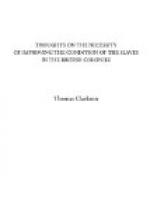It told the colonial assemblies, You are safe for the
present from the interference of the British Parliament,
on the belief, and on the promise made for you, that
left to yourselves you will do what is required of
you. To hold this language was sufficient.
The Assemblies might be left to infer the consequences
of a refusal, and Parliament might rest satisfied
with the consciousness, that they held in their hands
the means of accomplishing that which they had proposed.”
In a subsequent discussion of the subject in the House
of Lords, Lord Holland remarked, that “in his
opinion there had been more prejudice against this
Bill than the nature of the thing justified; but, whatever
might be the objection felt against it in the Colonies,
it might be well for them to consider, that it would
be
impossible for them to resist, and that,
if the thing was not done by them,
it would be done
for them.” But on this subject, that
is, on the subject of colonial rights, I shall say
more in another place. It will be proper, however,
to repeat here, and to insist upon it too, that there
is no
effectual way of remedying the evil complained
of, but by subjecting the colonial laws to the
revision
of the Legislature of the mother country; and perhaps
I shall disarm some of the opponents to this measure,
and at any rate free myself from the charge of a novel
and wild proposition, when I inform them that Mr.
Long, the celebrated historian and planter of Jamaica,
and to whose authority all West Indians look up, adopted
the same idea. Writing on the affairs of Jamaica,
he says: “The system[2] of Colonial government,
and the imperfection of their several laws, are subjects,
which never were, but
which ought to be, strictly
canvassed, examined, and amended by the British Parliament.”
The second and last step to be taken by the Abolitionists
should be, to collect all possible light on the subject
of emancipation with a view of carrying that
measure into effect in its due time. They ought
never to forget, that emancipation was included
in their original idea of the abolition of the
slave trade. Slavery was then as much an evil
in their eyes as the trade itself; and so long as
the former continues in its present state, the extinction
of it ought to be equally an object of their care.
All the slaves in our colonies, whether men, women,
or children, whether Africans or Creoles, have
been unjustly deprived of their rights. There
is not a master, who has the least claim to their
services in point of equity. There is, therefore,
a great debt due to them, and for this no payment,
no amends, no equivalent can be found, but a restoration
to their liberty.




